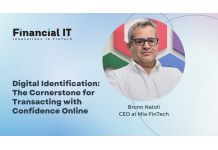2020 Predictions for Biometrics and Digital Identity

- Andrew Bud, Founder & CEO at iProov
- 22.01.2020 05:15 am #DigitalIdentity
I think there are few more exciting sectors than biometrics and digital identity in 2020, and it's a privilege to be in the midst of it all. Many of the themes that we’ve talked about for years, from digital identity as a service to biometric onboarding, will finally make it onto the main stage this year.
My top four predictions for 2020:
1. Digital identity as a service: serious players will emerge
2020 will be the year of the single digital identity. Serious industry players will start to emerge with credible, scaled offerings that allow consumers to create one digital identity for use in many different contexts and situations, from healthcare to car hire. The result for the consumer will be infinitely enhanced convenience, coupled with greater control of their own identity security.
Suppliers in this new market will likely come from different sources. Some will be national governments, others will be major commercial organisations - Mastercard has already declared an ambitious strategy in this arena – while others will come from unfamiliar sectors.
They will have at least one thing in common; a compelling reason for consumers to sign up and create a single identity in the first place.
2. Strong customer authentication (SCA) in banking will take off
We’re definitely going to see real action and innovation in strong authentication this year. This will be driven by the implementation of PSD2, whose provisions on SCA went largely ignored prior to the original deadline of September 2019. The new deadline for 2021 has been set, so we can expect to see a lot of activity here.
3. Biometrics for onboarding will become the norm
There’s going to be rapid acceptance of biometrics for automated onboarding in financial services in 2020. The regulations surrounding anti-money laundering, including 5AMLD and 6AMLD, make provision for remote authentication for the first time. They change the game entirely for how consumers go through the onboarding experience and provide opportunities for an overhaul of the services that banks can offer. This will be turbo-charged by Apple's release last September of the ability to read passports contactlessly from iPhones, joining Android and making it ubiquitous.
4. The public will recognise the threat of deepfakes
The potential impact of deepfake videos and images will be felt by the general public this year. Ultra-realistic material showing people saying and doing things that they did not say or do will force all of us to recognize the possible implications. If someone can create a convincing video of Barack Obama being incredibly rude about Donald Trump, what other havoc could be wreaked on our lives using this ever-evolving technology? Our identities, our finances, and our reputations could all be at risk.
What binds all of these things together is trust and control over personal attribute data. Identity is a subset of the personal data ecosystem and we will see privacy, security, the rights of state, centralized identity versus self-sovereignty and other societal issues move up the agenda.


























